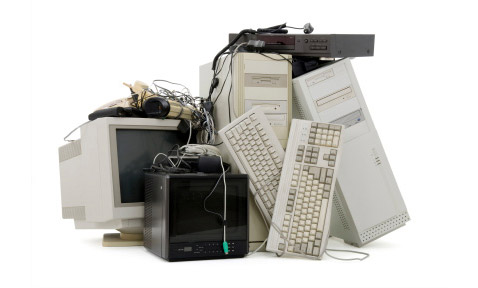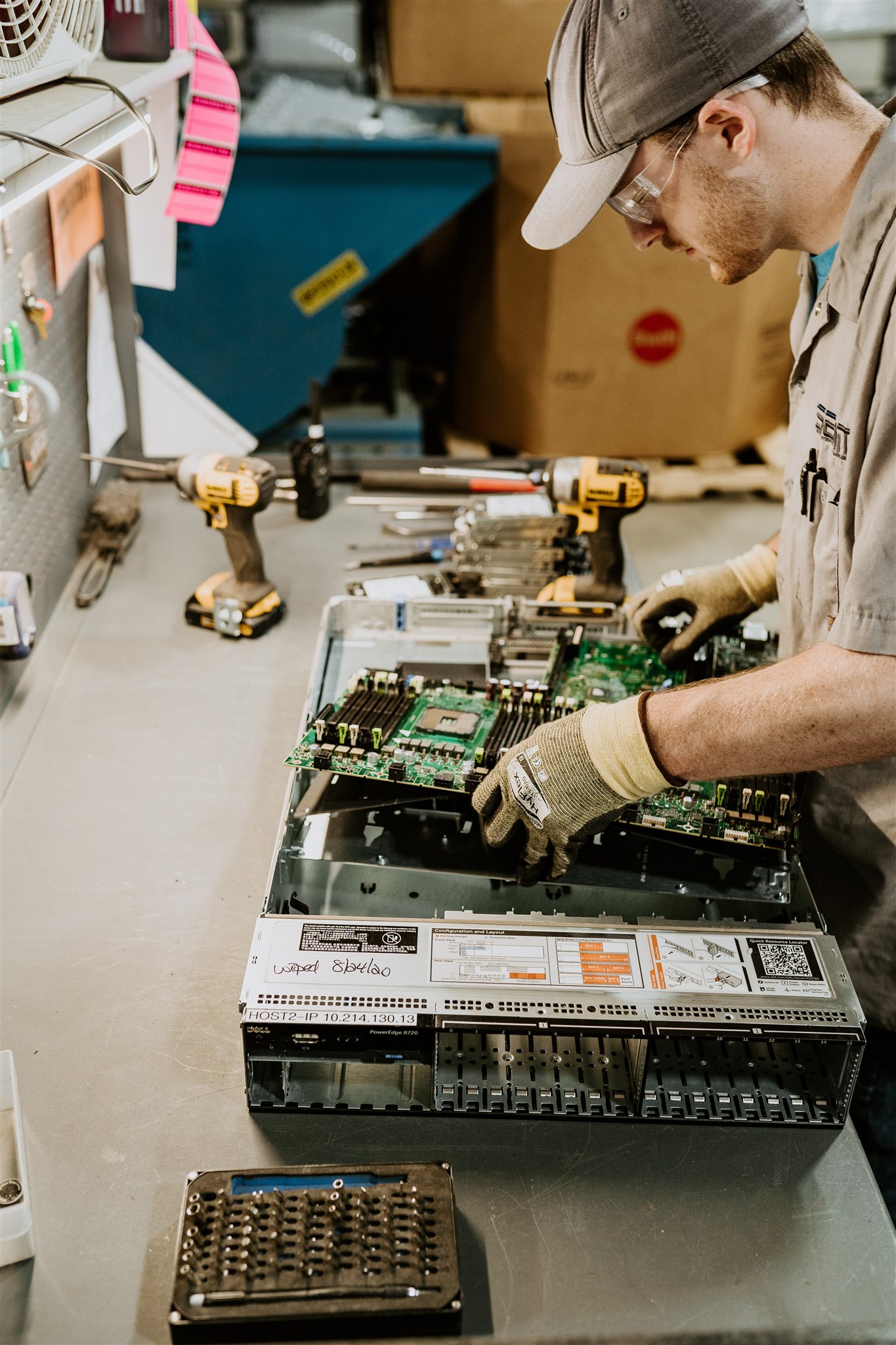Ecological Stewardship: The Relevance of Computer Recycling
Wiki Article
Sustainable IT Solutions: Trustworthy Computer Recycling Provider
As modern technology continues to advance at a quick pace, the problem of digital waste, or e-waste, has come to be a pushing concern for both companies and individuals alike. The improper disposal of computer systems and other electronic tools not only adds to ecological destruction, yet also presents considerable risks to human wellness. Due to this, the need for reliable computer system reusing services has never ever been more extremely important. In this discussion, we will discover the ecological influence of e-waste, the benefits of responsible computer recycling, how to select a trustworthy recycling service, the recycling process for computers and electronic devices, and the role of government policies in e-waste administration. Join us as we discover the sustainable IT options that can aid us browse the intricacies of electronic waste in a reliable and responsible manner.The Ecological Impact of E-Waste
The improper disposal of digital waste, frequently referred to as e-waste, has significant ecological implications. E-waste describes disposed of electronic devices such as tvs, mobile phones, and computer systems (computer recycling). These gadgets include hazardous products such as lead, mercury, cadmium, and brominated flame resistants, which can be dangerous to both human health and the setting if not effectively handledWhen e-waste is improperly disposed of, it commonly ends up in land fills or is incinerated, launching harmful substances right into the air, dirt, and water. The release of these unsafe products can contaminate groundwater, contaminate the air, and add to soil destruction, posing serious health and wellness risks to close-by communities and ecological communities.
Furthermore, the improper disposal of e-waste also adds to the depletion of all-natural sources. computer recycling. If appropriately reused, many digital devices include useful steels like gold, silver, and copper that can be recovered and recycled. When e-waste is not recycled, these beneficial resources are lost, and the need for brand-new raw materials rises, leading to boosted mining activities and more ecological degradation.
To alleviate the environmental influence of e-waste, proper recycling and disposal techniques must be employed. This consists of the liable collection, taking down, and recycling of digital tools to recover important materials and make certain the secure administration of harmful compounds. Carrying out efficient e-waste management practices is important to secure the atmosphere, conserve sources, and promote a sustainable future.

Benefits of Responsible Computer System Recycling
Appropriately recycling computers supplies a wide variety of advantages, consisting of environmental conservation and source conservation. Responsible computer system reusing not just assists avoid electronic waste from finishing up in garbage dumps, but it additionally lowers the requirement for raw materials and power in the production of new gadgets.Among one of the most substantial benefits of responsible computer system recycling is the conservation of the setting. When digital waste is incorrectly dealt with, it can launch harmful materials such as lead, mercury, and cadmium right into the soil and water, positioning a danger to communities and human health. By reusing computers, these dangerous products can be safely removed and thrown away, reducing the threat of pollution.
One more benefit is resource conservation. Computer systems contain useful materials like gold, silver, light weight aluminum, and copper, which can be recouped and recycled through recycling procedures. By extracting and reusing these products, the need for extracting new sources is lowered, conserving natural sources and decreasing the ecological influence of source removal.
Additionally, responsible computer system reusing helps to decrease energy usage. Production brand-new computer systems calls for a significant amount of energy, from the extraction of basic materials to the setting up procedure. By reusing computer systems and recycling their parts, the energy-intensive production procedure can be stayed clear of, leading to a reduction in greenhouse gas emissions and a more sustainable use of energy resources.
How to Select a Trustworthy Computer Recycling Service
When choosing a computer recycling service, it is necessary to consider a couple of vital factors to guarantee that you choose a trustworthy and trustworthy provider. Firstly, it is crucial to validate if the reusing solution complies with proper environmental laws and techniques. A trusted supplier will certainly have accreditations and accreditations that demonstrate their dedication to accountable recycling. Look for qualifications such as R2 (Liable Recycling) or e-Stewards, which make sure that the recycling procedure satisfies strict criteria for ecological protection and information safety. Secondly, examine if the service supplies safe data devastation. Data security is an essential issue when reusing computers, as delicate information saved on old devices can be prone to theft or abuse. A credible recycling service need to have safe information damage protocols in location, such as data cleaning or physical damage of storage tools. Furthermore, take into consideration the service's track record and track record. Seek reviews or endorsements from previous customers to evaluate their degree of consumer satisfaction and reliability. Last but not least, consider the service's openness and accountability. A trustworthy carrier should be able to supply thorough information regarding their recycling process, consisting of just how they take care of hazardous materials and guarantee proper disposal. By thinking about these aspects, you can pick a computer system reusing solution that is moral, reputable, and eco liable.
The Recycling Process for Computer Systems and Electronic Tools
To make sure liable disposal and decrease environmental impact, comprehending the recycling procedure for computer systems and electronic tools is essential when picking a reliable recycling service. The reusing process for these devices commonly includes several phases.Firstly, the tools are gathered from individuals, services, or drop-off points. This collection procedure may entail transportation logistics and secure dealing with to protect the delicate data consisted of within the devices. As soon as gathered, the tools are sorted based upon their type, such as smartphones, desktops, or laptop computers.
After arranging, the tools go through a complete information destruction procedure to guarantee that any type of delicate or individual information is permanently gotten rid of. This step is important to protect the personal privacy and safety and security of individuals and companies. Information destruction methods might include wiping, degaussing, or physical devastation of the storage media.
Following, the tools are disassembled into their private parts. This allows for the separation of various materials, such as plastics, metals, and motherboard. These materials are after that sent to specialized recycling facilities for additional handling.
The recycling centers use various methods to draw out useful products from the digital waste. These products can be recycled or repurposed in the manufacturing of new check over here products. The remaining waste is taken care of in an environmentally responsible fashion, sticking to governing standards.
The Function of Federal Government Rules in E-Waste Administration
Federal government guidelines play a critical duty in the reliable monitoring of e-waste. With the continual development of the electronics industry and the increasing problem for ecological sustainability, the demand for appropriate disposal and recycling of electronic waste has actually ended up being much more evident. Government laws assist to make sure that e-waste is managed in a sustainable and accountable manner.Among visit site the key functions of government regulations is to establish requirements and guidelines for e-waste monitoring. These policies specify the correct techniques for collection, transportation, and recycling of digital waste. By establishing these criteria, governments can guarantee that e-waste is handled in a manner that reduces its impact on the setting and human health.
Federal government policies also play an essential duty in implementing the proper disposal of digital waste. They require makers and retailers to take duty for the products they market and create. This consists of carrying out take-back programs, where producers are accountable for gathering and recycling digital waste from consumers. These laws assist to move the burden of e-waste management from the private customer to the market, making certain that electronic waste is handled in an extra sustainable manner.

Conclusion
To conclude, it is important to take into consideration the ecological see it here influence of e-waste and choose a trustworthy computer recycling service to properly dispose of digital tools. By following federal government guidelines and taking part in correct reusing procedures, we can minimize the unfavorable results of e-waste on the setting and advertise a much more lasting future.In this discussion, we will discover the ecological influence of e-waste, the advantages of liable computer system recycling, exactly how to select a credible recycling service, the recycling procedure for computer systems and digital gadgets, and the role of government regulations in e-waste monitoring. Computer systems consist of important materials like gold, light weight aluminum, copper, and silver, which can be recovered and recycled with recycling processes.In addition, liable computer reusing assists to decrease power intake. Data safety is an important worry when recycling computer systems, as sensitive information saved on old gadgets can be vulnerable to burglary or misuse. By considering these factors, you can select a computer reusing service that is moral, trustworthy, and ecologically liable.
Report this wiki page